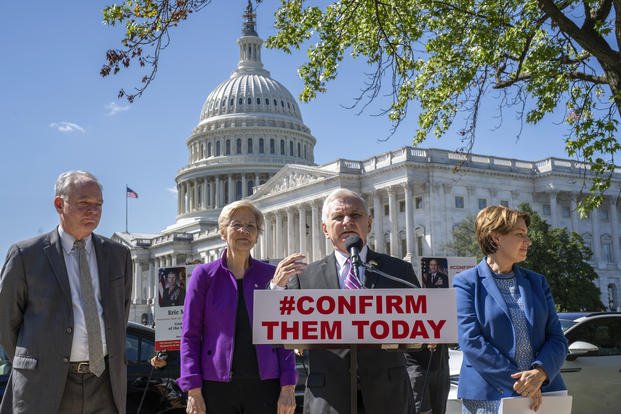The opinions expressed in this op-ed are those of the author and do not necessarily reflect the views of Military.com. If you would like to submit your own commentary, please send your article to opinions@military.com for consideration.
On Dec. 19, the U.S. Senate confirmed the last remaining four-star generals and admirals whose promotions had been blocked for the last 10 months. With these votes, we can finally close the book on Alabama Republican Sen. Tommy Tuberville's one-person crusade against the U.S. military.
But before we move too quickly past this saga, it's important that we pause to analyze how our military community overcame this blockade. If we don't, we leave the door open to future lawmakers repeating the same shenanigans and worsening the permanent damage this political stunt has already done to U.S. national security.
The story of Tuberville's failed blockade is essentially the story of a schoolyard bully. For months, the senator picked on a group of people who couldn't fight back, over a policy disagreement they had nothing to do with. And he almost got away with it. A number of strong, powerful people tried to fight back with stern letters and press conferences, but to no avail.
What finally tipped the scales was a group of diverse voices who didn't seem that strong or powerful on their own but, by working together, they managed to win the day.
That group? Regular, everyday military spouses and families who finally said, "Enough! We are not your bargaining chips."
The beginning of the end for Tuberville's bullying started this summer. Our team at Secure Families Initiative (SFI) saw the harm that this block on promotions was having on folks within our network. From families indefinitely stuck in temporary lodging, to spouses losing job opportunities, to kids missing school registration deadlines -- the consequences were growing.
But the impacts didn't end with only those on the promotion list. All military families felt shock and despair that decision-makers with so much power over our lives would treat us so callously. How on earth were we supposed to tell the 18- and 19 year-olds in our lives to sign up for the military when this would be their future?
Yet these stories of impact weren't showing up in a lot of the media coverage. Military families didn't see ourselves in the news, even though we were the news.
So we did something about it. SFI wrote a petition that resonated with military families across the country, and we delivered that petition directly to Capitol Hill because it was time for us to hold the schoolyard bully accountable for his actions.
That step, combined with our ongoing outreach to key Senate offices, finally turned the tide. On Dec. 5, Tuberville folded, and two weeks later, all the remaining officers were approved by the Senate.
For a long time, military spouses have been told (either explicitly or by social norms) to keep our voices and opinions to ourselves. We shouldn't complain when things go wrong because we should have known what we signed up for.
The problem with that culture of silence, though, is that it leaves military service members completely helpless. If they can't speak up when something's happening, who's to stop someone from preying on that vulnerability for their own political gain?
This setup isn't new. But the norms around what political stunts are considered "acceptable" have changed; the traditional decency of treating military matters apolitically has vanished. If this is our new era, it's time for military spouses to rise to the occasion.
For too long, too many policy conversations about us have been happening without us. Military families are stakeholders and constituents, so we deserve to have our voices heard. Indeed, if this saga demonstrates something, it's that we need to make our voices heard if anything is expected to change.
This week's victory proves our theory that military families can have power and influence when we organize ourselves and push for change. It's crucial that we remember that power the next time a big issue arises that impacts us.
-- Sarah Streyder is the executive director of Secure Families Initiative and an active-duty Space Force spouse. Sarah was the 2022 AFI Military Spouse of the Year and a 2023 George W. Bush Veteran Leadership Scholar.











